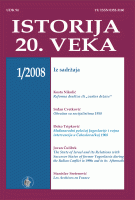POGLED IZ BEOGRADA NA BANDUNŠKU KONFERENCIJU 1955. GODINE
THE 1955 BANDUNG CONFERENCE: VIEW FROM BELGRADE
Author(s): Dragomir Bondžić, Slobodan SelinićSubject(s): History
Published by: Institut za savremenu istoriju, Beograd
Keywords: The conference Bandung; communism; Yugoslavia; colonialism;
Summary/Abstract: The conference of the 29 countries of Asia and Africa was held between 18 and 24 April 1955 in Bandung, Indonesia. It was convened by the governments of Burma, Indonesia, Ceylon and Pakistan. The conference adopted the concluding communiqué and brought resolutions related to disarmament, struggle against colonialism, economic and cultural cooperation between Asian and African countries, and right of self-determination, as well as the support to the claims of the Arabs of Palestine. The French government was asked to peacefully commit to the solution of problems in Tunisia, Morocco and Algeria. The conference adopted resolution on peace and cooperation in the world based on ten principles. Despite the attempts of the Yugoslav press to cover the conference in a neutral manner, the public supported or showed sympathies towards certain participants of the conference or their political decisions. Although it was clear that the attending countries differed in many respects – some were UN members while others weren’t; 14 were monarchies and 15 republics, etc, there was an evident tendency in the Yugoslav public to diminishing or overlook these differences. Yet some of them belonged to the British Commonwealth, and some to French Union, some to Arab League. Turkey was a NATO member; the Philippines, Siam and Pakistan were signatories to the Manila Treaty. Libya was tied to USA and Great Britain, China and Northern Vietnam for USSR, and the other countries were non-aligned (India, Burma, Indonesia, Ceylon and Egypt). Despite those differences, Belgrade emphasized common denominators of those countries. It was repeatedly mentioned that half of the mankind lives in the countries represented at Bandung. Nehru enjoyed the greatest sympathies. His demands for application of principle of coexistence were emphasized, as well as his positions against the alignment and polarization of the world. Peaceful performance of Zhou Enlai, who was the second best for Yugoslav public, was also very well accepted. Yugoslav public opinion creators were attempting to diminish the importance of anti-communist opinions expressed at the conference. Thus, the speech by the Iraqi representative Fadil Jamali, who attacked communism as „the new form of colonialism, deadlier than the previous“ was only mentioned via a critique of its points, and presented in Yugoslavia as dissonant from the dominant atmosphere of „international tolerance and cooperation“.
Journal: Istorija 20. veka
- Issue Year: 2008
- Issue No: 1
- Page Range: 71-85
- Page Count: 14
- Language: Serbian

